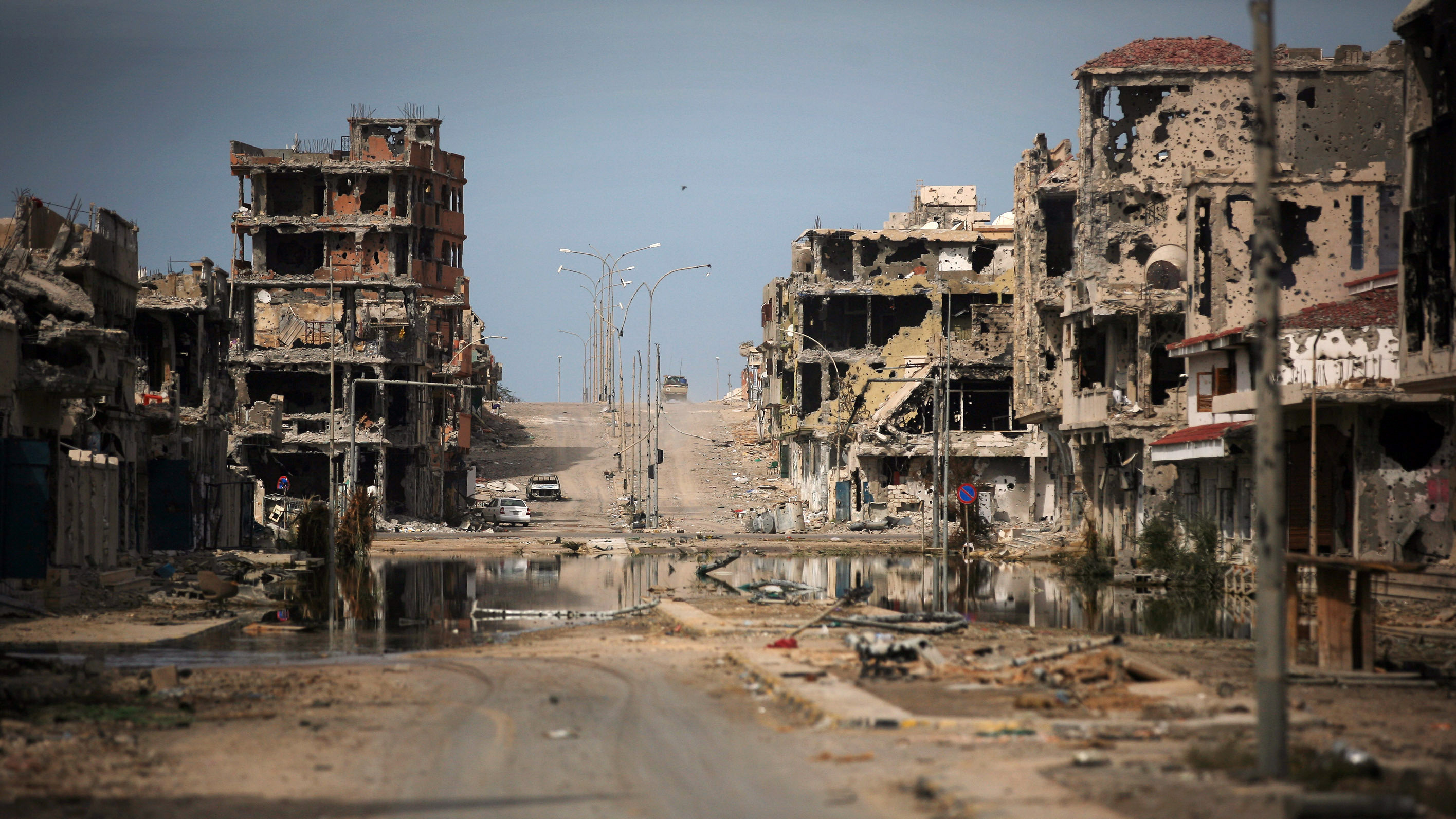
A general view of buildings ravaged by fighting in Sirte, Libya. /AP
A general view of buildings ravaged by fighting in Sirte, Libya. /AP
Editor's note: Stephen Ndegwa is a Nairobi-based communication expert, scholar and lecturer at the United States International University-Africa, author and international affairs columnist. The article reflects the author's opinions and not necessarily the views of CGTN.
The just concluded Libya conference in Germany marks one of the contradictions of the West's stance on democracy. After presiding over the total destruction of one of Africa's most progressive nations and its leader in the 20th Century, Colonel Muammar Gaddafi, the West still wants to be seen as the savior of the Libyan people from the hands of a ruthless dictator.
This is the second conference after the first one held in January 2020, also hosted by Germany. Apart from a formal cease-fire in October of 2020 between the Tripoli-based Government of National Accord and the Benghazi-based Libyan National Army, and the formation of an interim government formed under the United Nations in February 2021, the country is largely war-torn.
Previous political and military solutions proposed for the ravaged oil-rich country have come to naught, and not much is expected to happen with the largely foreign intervention that downplays the substantial input of the warring parties. The situation is similar to the impasse in Somalia which has not known peace and stability since the civil war started in 1991, again caused by U.S. interventionism.
The Libyan conference should have been held in the U.S., the country that initiated the horrendous murder of Gaddafi, who ruled the country from 1969 until his assassination on October 20, 2011. Before instigating his death by the rebel National Transitional Council, the U.S., as it has done in several other countries, had become an active player in the crisis, this time ostensibly to implement a United Nations-mandated no-fly zone against Gaddafi in the Libyan civil war.
Experts say the U.S. desperately wanted Gaddafi out of power after he started earnest efforts to form the United States of Africa, a proposal he made after being elected chairman of the 53-nation African Union in Ethiopia in February 2009. "I shall continue to insist that our sovereign countries work to achieve the United States of Africa," he said at the meeting, further proposing "a single African military force, a single currency and a single passport for Africans to move freely around the continent."
That must have sent a red flag at the time that in the near future it would not be business as usual again for the West in its one-sided deals with African nations, both bilaterally and multilaterally. While it might not have minded a unified Africa per se, it is the prospect of the openly hostile anti-Western Gaddafi as leader of the pack that sent chills in the West.

A Libyan fighter is seen by his car near the coastal city of Derna, northeast Libya, April 14, 2018. /VCG
A Libyan fighter is seen by his car near the coastal city of Derna, northeast Libya, April 14, 2018. /VCG
It was a case of giving a dog a bad name and hang him. The fact that the U.S. had branded Gaddafi a Muslim fundamentalist working towards the destruction of the Western society ensured that its allies were reading from the same script in ensuring that the visionary leader was utterly destroyed, effectively dismantling his Pan-African networks and plans.
Incidentally, holding the conference on Libya in Europe reawakens bitter memories of the Berlin Conference of 1884 that led to the scramble for Africa, the precursor to the unviable demarcation of the African continent and its colonialization. Many of Africa's problems today are a legacy of the subjugation of a whole race by European colonialists, something that is still alive through various machinations.
Indeed, analysts are asking questions about how much say Libya has in the talks and thus the final decisions that will be reached at the end of the conference. A recent article published on DW online noted that "there are questions about how much of a say Libyans will have in decisions" made at the meeting whose agenda includes assessing the country's political progress, preparing for a planned national election in December, and discussing the withdrawal of foreign troops and mercenaries.
Clearly, the U.S. has a case to answer on the Libyan case. Even as it waxes lyrical about the alleged genocide and other human rights abuses against China's Uygur Muslims in the Xinjiang Uygur Autonomous Region, it was the chief architect of the humanitarian tragedy that befell Muslims in Libya.
Instead of purporting to get solutions for a problem that it deliberately created, the U.S.-led Western alliance needs to use the summit to engage in sincere soul searching and apologizing to both Libya and the African continent for the irreparable social and economic damage it caused to the Libyan people.
For its mea culpa, the superpower should own up to its complicity and seek amends that prove its remorse. Since the damage has already been done, this includes mainly investing in the rebuilding of both the country's physical and social infrastructure to the high standards that Gaddafi had already established. Further, it can do other countries where it is currently meddling a favor by keeping out of their internal affairs and leave them to exercise their rights to self-determination.
(If you want to contribute and have specific expertise, please contact us at opinions@cgtn.com)

